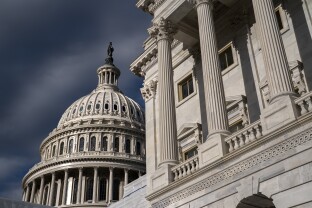The Supreme Court is shifting power away from “unelected bureaucrats” — but unless Congress steps up, the power is likely to fall into the hands of unelected judges.
The court has already delivered major wins to the conservative movement to cripple executive power, and it could deal another blow as soon as Thursday in a case challenging the Chevron doctrine.
“There is a simple remedy for the disparate treatment of bump stocks and machine guns. Congress can amend the law,” Justice Samuel Alito recently wrote of the court’s decision to overturn a ban on bump stocks.
Less than a week later, Senate Democrats tried to amend the law on bump stocks. They failed. And lawmakers and congressional experts told NOTUS that without a radical shift, it’s likely that regulations will fall apart over and over again without a functional Congress to replace them.
Rep. Jared Huffman believes that’s part of the goal of conservatives.
“Historically, we have written laws with regulatory actions in mind. We have intended to grant some of the details to regulatory agencies and that’s the way it actually should work,” said Huffman, who is leading a task force against Project 2025, a Trump-aligned effort against government agency authority. “It is definitely part of a deeper, darker corporate strategy than this euphemism about putting power back in Congress.”
Instead of shifting power to elected officials, stripping agency authority is likely to make judges more powerful, experts said.
“There is this worry that the courts are empowering themselves to a degree that is worrisome,” Elise Bean, director at the Levin Center for Oversight and Democracy, told NOTUS. “Overseeing an agency is much more practical than overseeing a judiciary with hundreds of individual judges.”
The upcoming Chevron doctrine ruling is likely to dramatically up the stakes. In the coming days, the Supreme Court is expected to formally overturn or significantly limit what’s called the Chevron doctrine, a 40-year precedent of courts deferring to agency authority when laws are ambiguous.
“Chevron deference is going to get overturned or restricted and we’re going to really have to step up,” congressional modernization expert Lorelei Kelly said. “If we don’t create public serving capacity for complex problem-solving, including regulations, things are going to start to fall apart.”
Some optimists argue that a Supreme Court rebuke of agency authority could jolt Congress into becoming better at passing laws. But it would take a major shift.
“It’s going to take Congress itself understanding that that’s going to require resources, that it’s going to require people, that it’s going to require technology. And also, it’s going to require lines of communication that currently do not exist,” said Marci Harris, a congressional modernization researcher who founded the POPVOX Foundation.
A core argument for overturning Chevron on the right is that “unelected bureaucrats,” as critics describe government agency employees, have too much power, and reining in agency authority will put power back in the hands of members of Congress — the government body most accountable to the people. That theory is now being put to the test.
“Conservatives and other folks who have been critical of the growth of the administrative state, they’ve been going after it for decades. OK, the moment’s come. What are you going to do about it?” American Enterprise Institute researcher Kevin Kosar told NOTUS. “It’s real now, and you can’t just issue words. You’ve got to do policy and what policy are you willing to do and take accountability from the voters on?”
—
Claire Heddles is a NOTUS reporter and an Allbritton Journalism Institute fellow.
Sign in
Log into your free account with your email. Don’t have one?
Check your email for a one-time code.
We sent a 4-digit code to . Enter the pin to confirm your account.
New code will be available in 1:00
Let’s try this again.
We encountered an error with the passcode sent to . Please reenter your email.


